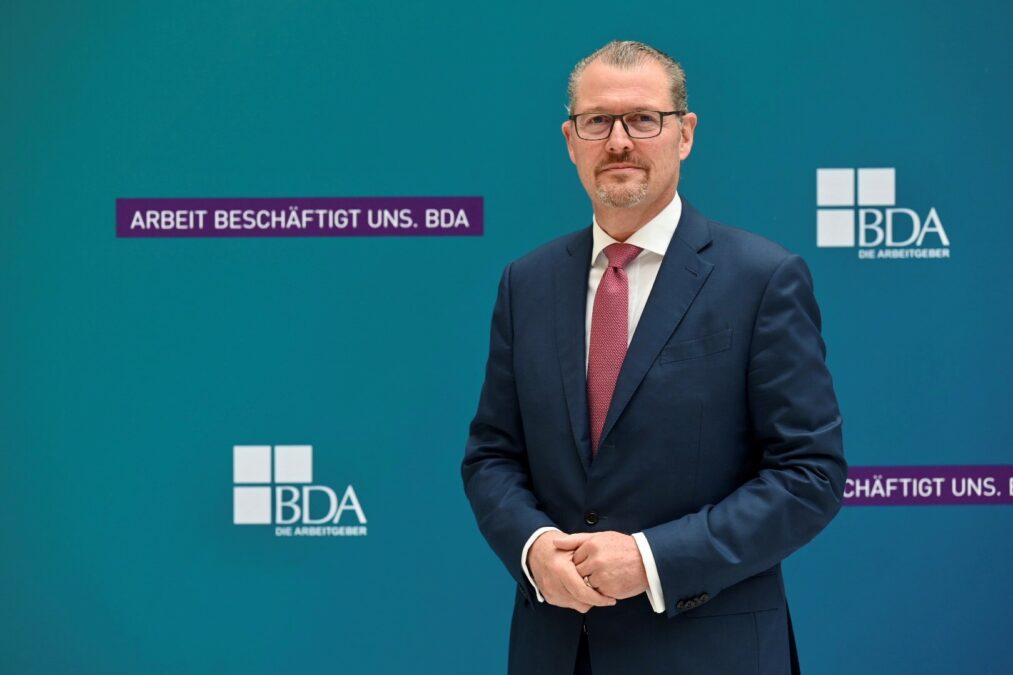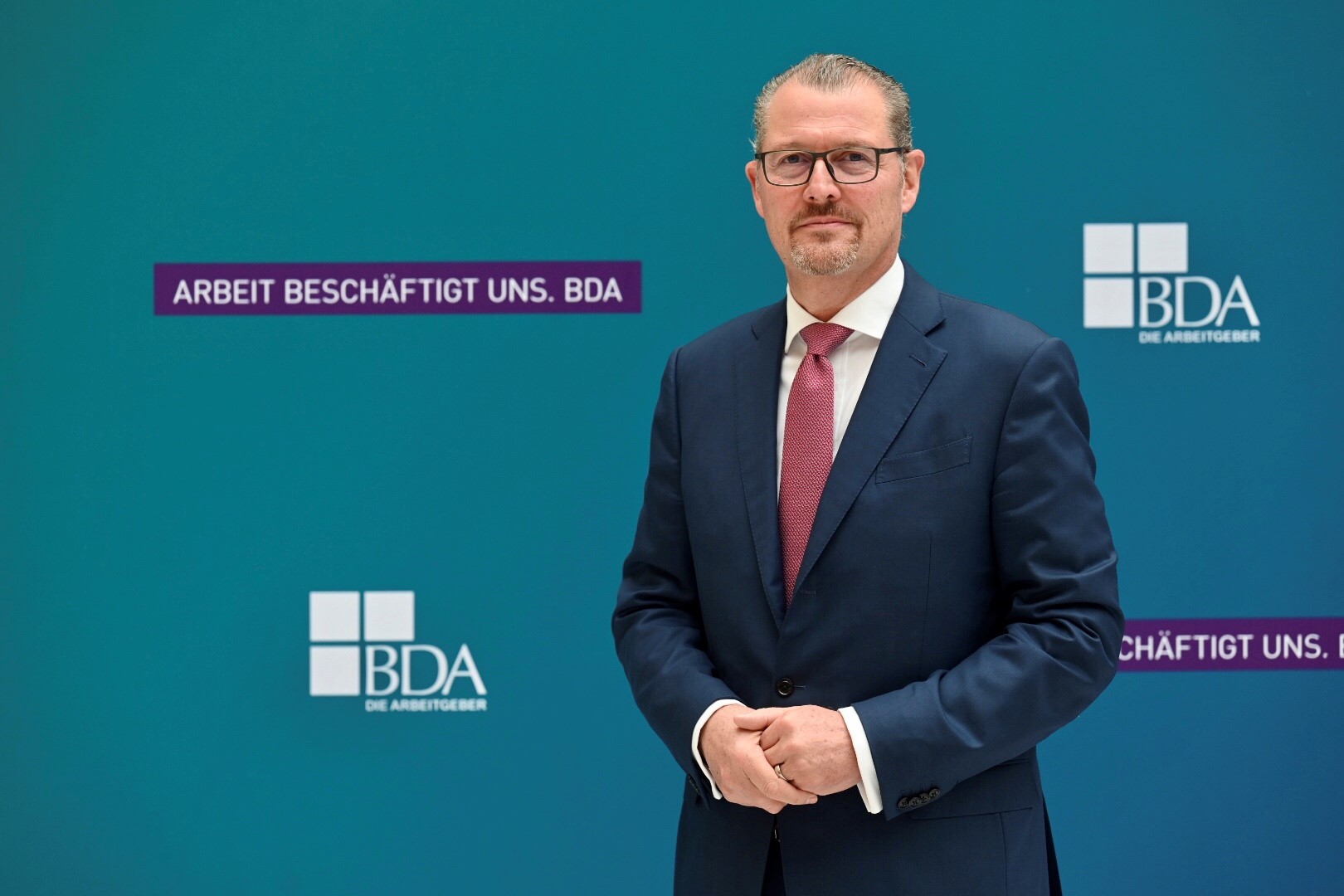It is right to increasingly address the social issues of our time. We employers are behind this. But a social Europe and a social union are not the same thing. Employers are firmly committed to improving social and economic conditions, while respecting national differences. A social union based on an unrealistic and therefore anti-social social policy through directives and regulations is not conducive to moving Europe forward. The different labour market and social systems that have developed historically cannot simply be levelled out.
- TOPICS
-
-
- Employment and Labour Market
- Labour law and collective bargaining policy
- General applicability
- Industrial action
- Labour & collective bargaining law
- Working time
- Time limit
- Works Constitution
- Bureaucracy reduction
- Data protection
- Protection against discrimination
- Parental leave
- Posting
- Insolvency
- Protection against dismissal
- Minimum wage
- Co-determination
- Mobile work
- Maternity protection
- Pandemic
- Care time
- Self-employment
- Tariff autonomy
- Collective Bargaining Agreement
- Collective bargaining unit
- Tariff policy
- Collective bargaining
- Collective agreement
- Part-time work
- Restructuring
- Holiday law
- Contracts for work
- Whistleblowing
- Temporary work
- Education and vocational training
- Training market
- Professional orientation
- Education policy
- Education 4.0
- Dual education
- dual study
- Permeability
- Early childhood education
- Higher Education Funding
- Lifelong learning
- Teacher Education
- Reorganization of education and training
- STEM Professionals
- Economic education
- Accreditation/Quality assurance
- SCHOOLBUSINESS Germany
- Digitalization and innovation
- Europe and International Affairs
- Social policy and social security
- Old-age poverty
- Work made in Germany
- Occupational safety
- Contribution and registration law
- Company pension scheme
- Shortage of company doctors
- Health insurance
- Long-term care insurance
- Mental health
- Pension insurance
- Riester pension
- Social self-government
- Social insurance
- Accident insurance
- The future of social security
- Taxes & Finances
- Economy & Society
-
-
-
- Newsroom
- The BDA
- Members

A social Europe accepts the crucial role of the economy for social progress

Position of the President of the Employers' Association Dr. Rainer Dulger on the Social Summit of the European Union in Porto:
Berlin, 6 May 2021: When the EU leaders, the heads of state and government and the social partners meet at the Social Summit in Porto, the main aim will be to send a political signal: Europe must become more social. This motto comes as no surprise. In recent times, politicians have always attached more importance to the social dimension of Europe. And not only since the digital and ecological transformation as well as the pandemic posed new challenges to the world of work. The sovereign debt crisis had also already ensured a focus on this area.
A social market economy that also combines competitiveness with social balance in the Erhardian sense must also serve as a model for Europe. The foundation of the social summit in Porto - to implement the legally non-binding "European Pillar of Social Rights" through concrete legislation - leads us into a social union. It is frightening how the European Treaties, which establish national competence for social policy, are being overstretched in order to find supposedly suitable legal bases for new EU social policy legislation.
There is a danger that, in our zeal to supposedly improve the economy and society, we will upset well-functioning and established labour market and social models. For example, the German Minimum Wage Commission, which is made up of social partners, would no longer be able to decide as it has done up to now if what European parliamentarians and the Commission are demanding with a view to an EU Minimum Wage Directive comes true. The target of 70 or even 90 per cent collective bargaining coverage proposed at the same time is not only completely impractical, but also contradicts the negative freedom of association: no one in Germany may be forced to join a trade union or employers' association. The unfair alternative of declaring collective agreements generally binding endangers social partnership instead of protecting it. A minimum wage directive with these contents would not be a social policy boon, but an arrogance.
A social Europe accepts the crucial role of the economy for social progress. A social union, on the other hand, naively idealises the possibility of social improvement without an economic basis. This makes it dangerous. For the importance of economic stability has only become clearer in the light of the Covid 19 pandemic: Economic and structural reforms are needed in member states to ensure stability through increased employment and more flexible labor markets. Otherwise, the EUR 750 billion of debt planned for the EU in the course of reconstruction will become ballast for future generations alone, without unleashing any forces for growth. The social summit threatens to send out the wrong signal.
The completion of the internal market also deserves greater focus. The social policy credo must be: both employees and companies benefit from being part of the internal market and from being able to exploit its opportunities. It is and remains Europe's engine for jobs, competitiveness and prosperity. The current Posting of Workers Directive, however, creates new protectionism in the internal market. The intellectual grandchildren of Jacques Delors are in retreat instead of developing opinion leadership.
The EU should aim for a social Europe in which Member States receive the right support to secure social standards and economic growth. It is important to find a new balance between Member State and European ambitions in social policy: Trying to find EU legislative templates acceptable to all Member States in this sensitive area rarely leads to satisfactory results.
When political Europe meets in Porto to discuss the social dimension of the EU, we must address this. Why do we not dare to take the broader political perspective? One thing is obvious: Above all, a strong economy is the basis for a social Europe.






